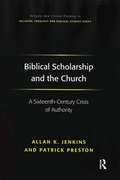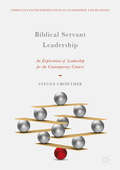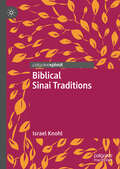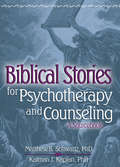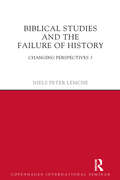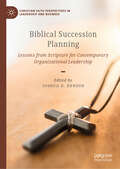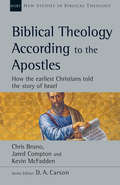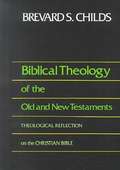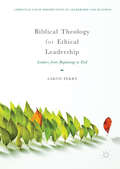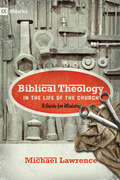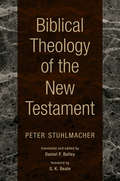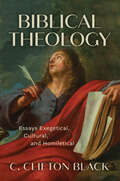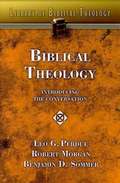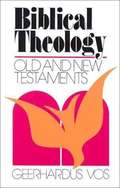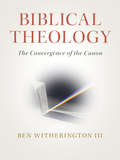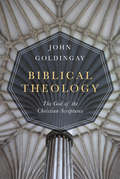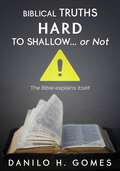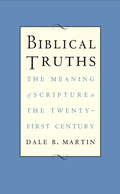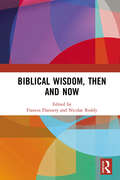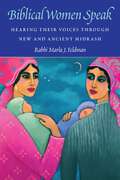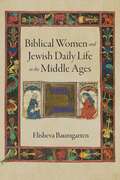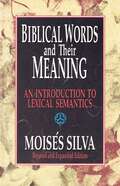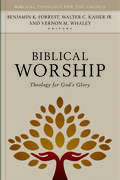- Table View
- List View
Biblical Scholarship and the Church: A Sixteenth-Century Crisis of Authority (Routledge New Critical Thinking in Religion, Theology and Biblical Studies)
by Allan K. Jenkins Patrick PrestonConflicting claims to authority in relation to the translation and interpretation of the Bible have been a recurrent source of tension within the Christian church, and were a key issue in the Reformation debate. This book traces how the authority of the Septuagint and later that of the Vulgate was called into question by the return to the original languages of scripture, and how linguistic scholarship was seen to pose a challenge to the authority of the teaching and tradition of the church. It shows how issues that remained unresolved in the early church re-emerged in first half of the sixteenth century with the publication of Erasmus’ Greek-Latin New Testament of 1516. After examining the differences between Erasmus and his critics, the authors contrast the situation in England, where Reformation issues were dominant, and Italy, where the authority of Rome was never in question. Focusing particularly on the dispute between Thomas More and William Tyndale in England, and between Ambrosius Catharinus and Cardinal Cajetan in Italy, this book brings together perspectives from biblical studies and church history and provides access to texts not previously translated into English.
Biblical Servant Leadership: An Exploration of Leadership for the Contemporary Context (Christian Faith Perspectives in Leadership and Business)
by Steven CrowtherThis book explores the concepts from Scripture for Servant leadership and compare these findings with contemporary models of servant leadership. It is an examination of Christian leadership for the contemporary world in its global and increasing secular context. Leadership studies typically view leadership externally from the results. This is a good beginning but leadership needs to also view the inside of leadership in the person of the leader. Scripture is uniquely qualified in this area since its first concern is the person who leads not just in leadership behaviors. The author uses examples from both the Old and New Testament to establish a new shepherd model of leadership that moves beyond the servant mode to the mode of caring direction. This model will provide scholars and researchers as well as leaders themselves with a way of leading that overcomes negative forms of leadership which lead to failure.
Biblical Sinai traditions
by Israel KnohlThis book discusses the the beginning of writing and the Beginning of Biblical Literature. Making the claim that the poetic descriptions of God's appearance from Sinai and the giving of commandments are older than the story in the Torah, this book looks at the drama of the redesign of Sinai traditions and their transfer from the oral poetic expression to the creation of written story. Taking place against the background of the intensification of literacy in the ancient Israeli society in the eighth century BC, the book argues that the emergence of scriptural prophecy is the other side of the same coin. This work is an important read for scholars of early Christianity.
Biblical Stories for Psychotherapy and Counseling: A Sourcebook
by Matthew Schwartz Kalman KaplanIntegrate Biblical spirituality into psychotherapy and examine centuries-old answers to modern psychological questions! The Joint Commision on the Accreditation of Hospitals now mandates taking spiritual assessments of all patients. This book is devoted to helping therapists employ Biblical spirituality in the actual treatment program. Biblical Stories for Psychotherapy and Counseling: A Sourcebook organizes the wisdom of the Old Testament into episodes that can shed light on specific psychological issues. From the familiar to the obscure, these stories can help us better understand self-esteem, loyalty and obligations, decision making, temptation, anger, morality, various disorders, family dynamics, support systems, developmental issues, recovery issues, aging, suicidal behavior, and more. From the authors: "As brilliant and as penetrating as Freud's insights are, they are limited in the sense that Freud relied heavily on Greek myth and literature for his models and ideas. His view of man was in many ways that of the Greeks-a view that concentrated on the pathological underside of man and on the bedrock of his developmental problems. The Greeks could never really shake the sense of doom, the foreboding and the fatalism that led so many great figures in Greek literature and in real life Greek history to depression and, in a surprising number of cases, to suicide. In contrast, the focus of the Bible is far more optimistic; depression can be successfully dealt with, and suicide is a sad error that should be-and usually can be-avoided. It encourages people to hope and teaches that day-to-day human effort has a purpose and meaning and that heroism is not a fair or useful aim for man to set for himself. The Bible offers the hope of filling every moment of human life with greater meaning and feeling. "New solutions to mental health problems are always welcome. Ours is a new approach, yet a very old one. We present stories that offer a vast treasure of knowledge and wisdom about the way people think and act, and why they do so. The stories are drawn from the Hebrew Bible, a compendium whose latest books are already twenty-four hundred or so years old. Yet, through all those centuries, the basic story of man's searching and yearning has changed little. We shall concentrate on the psychological meaning of these narratives and what they tell us about how their characters dealt with challenges of family, handicap, depression, and more." You'll also find information drawn from modern clinical research that parallels the Biblical narratives. The wisdom gained from these ancient stories is applied to help people gain self-understanding and deal with their own situations today. For psychotherapists, these Biblical foundation stories can be used as a basis for integrating spirituality into psychotherapy. The story of Moses, who overcame a speech problem, can be applied to the problems of a Midwestern college student, and the account of David and Goliath can help a businessman overcome his fears of "lack of macho." A small sample of the Bible stories-and their clinical implications-that you'll find in this volume: the foundation of self-esteem: Saul the courage to emigrate: Abraham assuming responsibility for one's self: Lot's wife focusing on one's main aim: Sarah and Hagar dealing with commandments: Abraham and Isaac dealing with temptations: Adam and Eve drunkenness and disrespect: Noah reciprocity between generations: Naomi and Ruth amoral intellectualism: Balaam aging: Ecclesiastes dealing with disability: Moses and Aaron abandonment: David protected regression: Jonah Biblical Stories for Psychotherapy and Counseling: A Sourcebook will become a well-used reference in your professional/teaching collection. These Biblical stories will be helpful to therapists, cle
Biblical Studies and the Failure of History: Changing Perspectives 3
by Niels Peter LemcheFirst published in 1986. Routledge is an imprint of Taylor & Francis, an informa company.
Biblical Succession Planning: Lessons from Scripture for Contemporary Organizational Leadership (Christian Faith Perspectives in Leadership and Business)
by Joshua D. HensonThis book focuses on the contemporary applications of effective and ineffective leader succession narratives for contemporary organizational leadership. From Moses and Joshua to Paul and Timothy, the Old and New Testaments are replete with narratives described the leader transitions of prophets, judges, kings, apostles, and pastors. Leadership succession is a complex process in that each situation is contextually unique. This book explores 10 narratives in the Bible that demonstrate the contextual complexities of leader succession and how leaders navigated it, for the good and bad. Each chapter focuses on a different example of leader succession: six Old Testament narratives, three New Testament narratives, and one chapter that takes a more holistic Scriptural approach. The chapters provide practical organizational leadership principles that can be applied to contemporary succession planning. Overall, this work contributes to an emerging field of succession planning and informs organizational leaders how to lead from a Biblical perspective.
Biblical Theology According to the Apostles: How the Earliest Christians Told the Story of Israel (New Studies in Biblical Theology #Volume 52)
by Kevin McFadden Jared Compton Chris BrunoHow did the apostles understand the Old Testament?
Biblical Theology Of The Old And New Testaments: Theological Reflection On The Christian Bible
by Brevard S. ChildsThis monumental work is the first comprehensive biblical theology to appear in many years and is the culmination of Brevard Child's lifelong commitment to constructing a biblical theology that surmounts objections to the discipline raised over the past generation. Childs rejects any approaches that overstress either the continuity or discontinuity between the Old and New Testaments. He refuses to follow the common pattern in Christian thought of identifying biblical theology with the New Testament's interest in the Old. Rather, Childs maps out an approach that reflects on the whole Christian Bible with its two very different voices, each of which retains continuing integrity and is heard on its own terms.
Biblical Theology for Ethical Leadership: Leaders From Beginning To End (Christian Faith Perspectives In Leadership And Business Ser.)
by Aaron PerryThis book argues that ethical leadership without a theological foundation is lacking a firm foundation. It begins with a critical assessment of ethical leadership as a leadership theory, showing how ethics and theology became separated, creating the space for ethical leadership outside of theology. Nevertheless, the author argues that ethical leadership without a biblical basis is weak, though one need not be religious to embrace the leadership principles of biblical theology. Unfolding Christology, anthropology, eschatology, and contextualized leadership as four key aspects of biblical theology for ethical leadership, this book will appeal to those studying leadership, business, innovation, and entrepreneurship.
Biblical Theology in the Life of the Church: A Guide for Ministry
by Michael LawrenceCapitol Hill Baptist Church associate pastor Michael Lawrence contributes to the IXMarks series as he centers on the practical importance of biblical theology to ministry. He begins with an examination of a pastor's tools of the trade: exegesis and biblical and systematic theology. The book distinguishes between the power of narrative in biblical theology and the power of application in systematic theology, but also emphasizes the importance of their collaboration in ministry. <P><P> Having laid the foundation for pastoral ministry, Lawrence uses the three tools to build a biblical theology, telling the entire story of the Bible from five different angles. He puts biblical theology to work in four areas: counseling, missions, caring for the poor, and church/state relations. Rich in application and practical insight, this book will equip pastors and church leaders to think, preach, and do ministry through the framework of biblical theology.
Biblical Theology of the New Testament
by Peter StuhlmacherFirst English edition of an iconic work of German scholarshipSince its original publication in German, Peter Stuhlmacher&’s two-volume Biblische Theologie des Neuen Testaments has influenced an entire generation of biblical scholars and theologians. Now Daniel Bailey&’s expert translation makes this important work of New Testament theology available in English for the first time.Following an extended discussion of the task of writing a New Testament theology, Stuhlmacher explores the development of the Christian message across the pages of the Gospels, the writings of Paul, and the other canonical books of the New Testament. The second part of the book examines the biblical canon and its historical significance. A concluding essay by Bailey applies Stuhlmacher&’s approach to specific texts in Romans and 4 Maccabees.
Biblical Theology of the New Testament
by Peter StuhlmacherFirst English edition of an iconic work of German scholarshipSince its original publication in German, Peter Stuhlmacher’s two-volume Biblische Theologie des Neuen Testaments has influenced an entire generation of biblical scholars and theologians. Now Daniel Bailey’s expert translation makes this important work of New Testament theology available in English for the first time.Following an extended discussion of the task of writing a New Testament theology, Stuhlmacher explores the development of the Christian message across the pages of the Gospels, the writings of Paul, and the other canonical books of the New Testament. The second part of the book examines the biblical canon and its historical significance. A concluding essay by Bailey applies Stuhlmacher’s approach to specific texts in Romans and 4 Maccabees.
Biblical Theology: Essays Exegetical, Cultural, and Homiletical
by C. Clifton BlackAn essential collection of C. Clifton Black&’s best essays on the theology of the New Testament Clift Black is well known and widely loved for his exegetical acuity, his theological seriousness, his pastoral kindness, and the most delightful sense of humor in the biblical studies guild. All these qualities are amply displayed in these thirty essays written across four decades of his career, including four essays that are published here for the first time. Biblical Theology: Essays Exegetical, Cultural, and Homiletical represents the fruit of a lifetime of studying, preaching, praying, training pastors, walking in the light, and laughing in the valley of the shadow of death. Black&’s keen mind and pastoral heart make this volume a rich contribution to the field of biblical theology.
Biblical Theology: Introducing the Conversation (Library of Biblical Theology)
by Leo PerdueOne of the thorniest problems in theological study is the relationship between biblical studies on the one hand, and constructive theology on the other. Theologians know that the Bible is the core source document for theological construction, and hence that they must be in conversation with the best in critical study of Scripture. For many biblical scholars, the point of what they do is to help the biblical text speak to today’s church and world, and hence they would do well to be in conversation with contemporary theology. Yet too often the two groups fail to engage each other’s work in significant and productive ways. The purpose of the Library of Biblical Theology, and this introductory volume to it, is to bring the worlds of biblical scholarship and constructive theology together. It will do so by reviving biblical theology as a discipline that describes the faith of the biblical periods on the one hand, and on the other hand articulates normative understandings of modern faith and practice. In this volume the authors begin by providing an overview of the history and possible future of biblical theology. They introduce biblical theology as a fundamentally contrastive discipline, one that is neither dogmatic theology (seeking to explain the official teachings of a particular Christian tradition), nor is it a purely historical approach to Scripture, eschewing questions of the Bible’s contemporary message and meaning. Rather, biblical theology takes seriously both the need to understand the message of Scripture in its particular historical context, and the need to address that message to questions that confront contemporary human life.
Biblical Theology: Old and New Testaments
by Geerhardus VosScholarly discussion of biblical interpretation.
Biblical Theology: The Convergence of the Canon
by Ben Witherington, IIIIn Biblical Theology, Ben Witherington, III, examines the theology of the Old and New Testaments as a totality. Going beyond an account of carefully crafted Old and New Testament theologies, he demonstrates the ideas that make the Bible a sacred book with a unified theology. Witherington brings a distinctive methodology to this study. Taking a constructive approach, he first examines the foundations of the writers' symbolic universe - what they thought and presupposed about God - and how they revealed those thoughts through the narratives of the Old and New Testaments. He also shows how the historical contexts and intellectual worlds of the Old and New Testaments conditioned their narratives, and, in the process, created a large coherent Biblical world view, one that progressively reveals the character and action of God. Thus, the Yahweh of the Old Testament, the Son in the Gospels, and the Father, Son, and Spirit in the New Testament writings are viewed as persons who are part of the singular divine identity. Sensitive to do a more than merely thematic reading of the Bible which strips texts out of their original context, Witherington's progressive revelation approach allows each part of the canon to be read in its original context and with its original meaning. The result is a Biblical theology that allows Jews and Christian's to dialogue about and appreciate the sacred scriptures in both testaments. The capstone work of an internationally known theologian, Biblical Theology also offers new insights on key theological issues, including the character of God, grace, covenants, salvation, election, and eschatology as they relate to the doctrine of God.
Biblical Theology: The God of the Christian Scriptures
by John GoldingayImagine someone who has spent a lifetime listening deeply and attentively to the full range of Scripture's testimony. Stepping back, they now describe what they have seen and heard. What emerges is a theological cathedral, laid out on the great vectors of Scripture and fitted with biblically sourced materials. This is what John Goldingay has done. Well known for his three-volume Old Testament Theology, he has now risen to the challenge of a biblical theology. While taking the New Testament as a portal into the biblical canon, he seeks to preserve the distinct voices of Israel's Scriptures, accepting even its irregular and sinewed pieces as features rather than problems. Goldingay does not search out a thematic core or overarching unity, but allows Scripture's diversity and tensions to remain as manifold witnesses to the ways of God. While many interpreters interrogate Scripture under the harsh lights of late-modern questions, Goldingay engages in a dialogue keen on letting Scripture speak to us in its own voice. Throughout he asks, "What understanding of God and the world and life emerges from these two testaments?" Goldingay's Biblical Theology is a landmark achievement—hermeneutically dexterous, biblically expansive, and nourishing to mind, soul and proclamation.
Biblical Truths Hard to Shallow… Or Not: The Bible explains itself
by Danilo H. GomesHow can you be sure your beliefs are biblically correct? Do they offer you? The amount of lies spread among the present times is alarming. Laziness or the frenetic pace of everyday life has distanced Christ's followers from the Holy Scriptures and their eternal and profound truths. BIBLICAL TRUTHS HARD TO SWALLOW… OR WILL NOT provoke - or offend - you as your certainties are shaken and the truths revealed. This is a set of quickly answered ringtones based on the Bible. Discover the facts that will surprise you like never before.
Biblical Truths: The Meaning of Scripture in the Twenty-first Century
by Dale B. MartinA leading biblical scholar's landmark work challenges the historical realism that has dominated the discipline for more than two centuries How can a modern person, informed by science and history, continue to recite the traditional creeds and confessions of the Christian church? What does the Bible mean and how do we verify biblical truths? In this groundbreaking book, a leading biblical scholar urges readers to be more creative interpreters of biblical texts, mapping out an alternative way of reading that is not first and foremost about understanding what those texts would have meant for the original authors and readers. Limiting our study to the ancient meaning of the text, he argues, has produced either bad history, or bad theology, or both. One cannot derive robustly orthodox Christian doctrine or theology from a mere "historical" interpretation of the Bible. Martin offers instead theological readings of the New Testament that are faithful to Christian orthodoxy as generally understood, but without attempting a "foundationalist" understanding of the meaning of the text. His provocative and ambitious book demonstrates how theology and scripture can remain vital in the twenty-first century.
Biblical Wisdom, Then and Now
by Frances FlanneryThis volume examines biblical wisdom literature both in its historical context and as it relates to a host of contemporary themes, including overcoming social divisions, reading from a place of inclusion, healing from trauma, and challenging religious attitudes toward climate change and animals. This volume delivers fresh insights on biblical wisdom texts, exploring ways in which wisdom literature speaks perennially to the human condition despite the differences in societies then and now. Employing both biblical studies and theological approaches, the diverse group of authors in this collection examine biblical wisdom literature from a variety of perspectives and methodologies to illuminate the relevance of wisdom for ancient audiences such as exiles, scribes, and leaders, as well as for contemporary audiences concerned with challenges such as climate change, social division, and healing from trauma. Its eleven chapters utilize an accessible style that brings erudite scholarship on biblical wisdom to a broader audience. Biblical Wisdom, Then and Now will be an invaluable resource for undergraduates, graduates, and specialists in biblical studies, as well as the more general reader with an interest in biblical literature and its reception.
Biblical Women Speak: Hearing Their Voices through New and Ancient Midrash
by Rabbi Marla J. FeldmanWhat were biblical women thinking and doing when the men around them received all the attention and glory? How did Leah, Rachel, and their handmaids negotiate the complicated family dynamics of four women vying for Jacob&’s affections? What compelled Potiphar&’s wife to risk her high station to seduce Joseph, an enslaved foreigner? How did the midwives and Pharoah&’s daughter conspire to rescue baby Moses, right under Pharoah&’s nose?Biblical Women Speak employs midrash (interpretative techniques) to discover ten biblical women&’s stories from a female point of view and provide insights beyond how ancient male scholars viewed them. Each chapter brings alive a different biblical woman, including non-Israelite characters and others who are neglected in classical rabbinic texts, such as Keturah (Abraham&’s last wife), Bat Shuah (Judah&’s wife), Shelomith (the infamous blasphemer&’s mother), and Noah (one of Zelophehad&’s brave daughters who demanded inheritance rights). After each featured text we hear a creative retelling of the woman&’s story in her own voice, followed by traditional midrash and medieval commentaries and the author&’s reflections on how these tales and interpretations are relevant for today. Rabbi Marla J. Feldman&’s book is an engaging invitation to enter biblical narratives, challenge conventional wisdom, and recalibrate the stories and lessons through the lens of our own lives.
Biblical Women and Jewish Daily Life in the Middle Ages (Jewish Culture and Contexts)
by Elisheva BaumgartenIn Biblical Women and Jewish Daily Life in the Middle Ages, Elisheva Baumgarten seeks a point of entry into the everyday existence of people who did not belong to the learned elite, and who therefore left no written records of their lives. She does so by turning to the Bible as it was read, reinterpreted, and seen by the Jews of medieval Ashkenaz. In the tellings, retellings, and illustrations of biblical stories, and especially of those centered around women, Baumgarten writes, we can find explanations and validations for the practices that structured birth, marriage, and death; women's inclusion in the liturgy and synagogue; and the roles of women as community leaders, givers of charity, and keepers of the household.Each of the book's chapters concentrates on a single figure or a cluster of biblical women—Eve, the Matriarchs, Deborah, Yael, Abigail, and Jephthah's daughter—to explore aspects of the domestic and communal lives of Northern French and German Jews living among Christians in urban settings. Throughout the book more than forty vivid medieval illuminations, most reproduced in color, help convey to modern readers what medieval people could have known visually about these biblical stories. "I do not claim that the genres I analyze here—literature, art, exegesis—mirror social practice," Baumgarten writes. "Rather, my goal is to examine how medieval Jewish engagement with the Bible offers a window onto aspects of the daily lives and cultural mentalités of Ashkenazic Jews in the High Middle Ages."In a final chapter, Baumgarten turns to the historical figure of Dulcia, a late twelfth-century woman, to ponder how our understanding of those people about whom we know relatively more can be enriched by considering the lives of those who have remained anonymous. The biblical stories through which Baumgarten reads contributed to shaping a world that is largely lost to us, and can help us, in turn, to gain access to lives of people of the past who left no written accounts of their beliefs and practices.
Biblical Words and Their Meaning: An Introduction to Lexical Semantics
by Moisés SilvaWhen first published in 1983, Biblical Words and Their Meaning broke new ground by introducing to students of the Bible the principles of linguistics, in particular, on lexical semantics -- that branch that focuses on the meaning of individual words. Silva's structural approach provides the interpreter with an important lexical tool for more responsible understanding of the biblical text and more effective use of standard exegetical resources. This revised edition includes a bibliographical essay by Silva, "Recent Developments in Semantics," and an appendix by Karen H. Jobes, "Distinguishing the Meaning of Greek Verbs in the Semantic Domain for Worship," that provides the reader with a substantive example of lexical study.
Biblical Worldview: Creation, Fall, Redemption
by Bju PressBiblical Worldview: Creation, Fall, Redemption Student Text was created to appeal to student interest and develop understanding. Application examples taken from history and recent events resonate with students, motivating them to apply Scripture to issues that are crucial to their spiritual growth. Apologetics is interwoven throughout the textbook, equipping students to defend the foundational teachings of the Bible against competing worldviews. At the same time, the framework of Creation, Fall, Redemption enables students to make distinctively Christian contributions to their culture.
Biblical Worship: Theology for God's Glory (Biblical Theology for the Church)
by Benjamin K. ForrestA biblical theology of worship spanning both the Old and New TestamentsWhile many books on worship focus on contemporary trends, Biblical Worship plumbs every book of the Bible to uncover its teaching on worship and then applies these insights to our lives and churches today. A team of respected evangelical scholars unearths insights into a variety of issues surrounding worship, including:• The Old Testament concept of worship• Worship before the Exodus• Worship in the Old Testament feasts and celebrations• Worship in the Psalms of Lament and Thanksgiving• The New Testament concept of worship• Worship in the Gospels• Worship in Acts• Worship in the Pastoral Epistles, and much more.Pastors, worship leaders, instructors, and anyone who wants to grow in their knowledge of the Bible's full teaching on worship and how it applies today will benefit from this volume, part of the Biblical Theology for the Church series.
